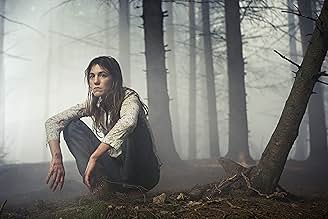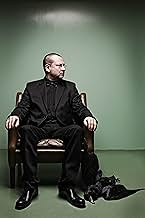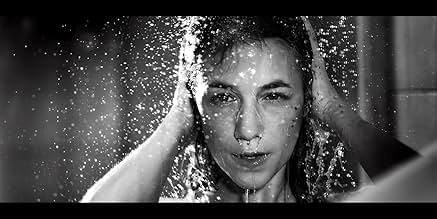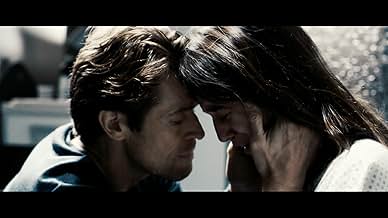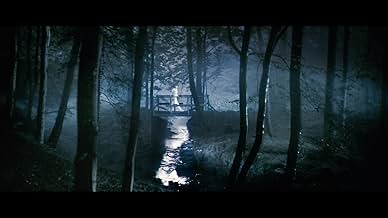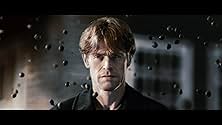Un couple en deuil se retire à leur cabane dans les bois, espérant de réparer leurs coeurs brisés et mariage en difficulté, mais la nature suit son cours et les choses s'empirent.Un couple en deuil se retire à leur cabane dans les bois, espérant de réparer leurs coeurs brisés et mariage en difficulté, mais la nature suit son cours et les choses s'empirent.Un couple en deuil se retire à leur cabane dans les bois, espérant de réparer leurs coeurs brisés et mariage en difficulté, mais la nature suit son cours et les choses s'empirent.
- Director
- Writer
- Stars
- Prix
- 21 victoires et 33 nominations au total
Avis en vedette
This movie is violent and very sexually graphic, bordering at times on artistic but hardcore pornography; but it isn't lurid for the sole purpose of scandal. "Gory" appropriately describes some sections of this film but the word by no means encapsulates it.
If one is willing to stomach the periodic revulsion of watching this movie from beginning to end with a thoughtful and mature perspective they will find that it is full of symbolism, foreshadowing, and the kind of characterization that brings great success to novels. Few movies, in fact, possess the level of depth that Antichrist does. The movie isn't packed with moral insight but that doesn't preclude it from being intellectually engaging and, as a consequence, genuinely entertaining. One will also realize that the violent and sexual content is never pure excess. The gory scenes, though sickening, are always important in some way to the main themes of the movie.
At several points during the course of this film I couldn't help but rewind it to watch a scene again, discuss it in greater depth with my friends, attempt to extricate the finer details that are present in abundance both at the surface and underneath.
To anybody that tries to berate this movie as the deranged product of excessively liberal foreigners I must point you to movies like Saw, which drew American crowds young and old for numerous sequels that were basically just series' of elaborate and gruesome torture scenes, sometimes clever but never much more than that.
There is more to Antichrist than meets the eye, and I highly recommend it to anybody looking for a horror/suspense film that engages more than just the reptilian parts of the brain.
If one is willing to stomach the periodic revulsion of watching this movie from beginning to end with a thoughtful and mature perspective they will find that it is full of symbolism, foreshadowing, and the kind of characterization that brings great success to novels. Few movies, in fact, possess the level of depth that Antichrist does. The movie isn't packed with moral insight but that doesn't preclude it from being intellectually engaging and, as a consequence, genuinely entertaining. One will also realize that the violent and sexual content is never pure excess. The gory scenes, though sickening, are always important in some way to the main themes of the movie.
At several points during the course of this film I couldn't help but rewind it to watch a scene again, discuss it in greater depth with my friends, attempt to extricate the finer details that are present in abundance both at the surface and underneath.
To anybody that tries to berate this movie as the deranged product of excessively liberal foreigners I must point you to movies like Saw, which drew American crowds young and old for numerous sequels that were basically just series' of elaborate and gruesome torture scenes, sometimes clever but never much more than that.
There is more to Antichrist than meets the eye, and I highly recommend it to anybody looking for a horror/suspense film that engages more than just the reptilian parts of the brain.
John Doe says in "Se7en": "Wanting people to pay attention, you can't just tap them on the shoulder. You have to hit them in the head with a sledgehammer." L. von Trier was tapping on the shoulder with "Dogville". He turns to a sledgehammer with "Antichrist". The problem is that when you have been hit by the extremities of his latest endeavor the most appropriate question you may want to ask seems to be suggested by the next line of the late detective Mills: "What makes you so special that people should pay attention?"
This movie doesn't strike as an overt emotional manipulation like "Dancer in the Dark" (the fact that the latter is really something that can be described in such a way was eventually admitted even by the director himself). The cinematography is stunning - in a good sense of the word. Several frames with Willem Dafoe's face will certainly enter the gallery of iconic images provided by modern cinema. Even the dedication to Tarkovsky was not vain. But von Trier is neither stupid/ talentless nor childish/egocentric - hopefully, at least - to the extent to actually consider making movies a kind of therapy, and the screening room his own private couch at a shrink's. So he is trying to bring in a meaning here after all. If so what is it?
What is that point he is trying to deliver? Human nature is far from being perfect? It's hardly new news. The aesthetic audacity and harshness of images in "Dogville" were fully justified by a consistency of its message, which they conveyed in a completely adequate way. As far as I can see, von Trier was talking then about the unbearable hypocrisy of our modern civilization and an inevitable catastrophe this civilization is heading for (while his account made I'm afraid a pretty accurate description of the actual situation). What does he have to add with this feature? Is it that all evil which falls upon people is intrinsically immanent in human nature? Having experienced or witnessed a critical amount of grief, pain and despair man comes to some point when even a concept of good, God, hope or whatever you call it is becoming virtually inconceivable? And after that chaos reigns? That to fight that man has to kill an evil in himself which he might love? But this fight is doomed anyway if a natural arena for it happens to be a world "issued by Satan"? It's a kindergarten philosophy. Some of these things may very well be true and correct, but to make all these daring assumptions and observations it's quite sufficient to have read a dozen of books or had just one good look around. There can be several more interpretations - some somewhat less coherent, some even more banal. What are justifications of all this excruciating imagery we encounter in "Antichrist" then? It's not quite clear.
So I should say that it is a bit surprising that the audience has happened to be so polarized. In fact, this movie is neither too good, nor too bad. And I might be missing something but I have a strong feeling that von Trier can be quite justly accused on this particular occasion of doing something he was quite wrongly accused of doing on some previous ones - of trying to compensate in a badly provocative manner a certain shallowness of his work and its half-baked message by the extremities of the way in which they are presented.
This movie doesn't strike as an overt emotional manipulation like "Dancer in the Dark" (the fact that the latter is really something that can be described in such a way was eventually admitted even by the director himself). The cinematography is stunning - in a good sense of the word. Several frames with Willem Dafoe's face will certainly enter the gallery of iconic images provided by modern cinema. Even the dedication to Tarkovsky was not vain. But von Trier is neither stupid/ talentless nor childish/egocentric - hopefully, at least - to the extent to actually consider making movies a kind of therapy, and the screening room his own private couch at a shrink's. So he is trying to bring in a meaning here after all. If so what is it?
What is that point he is trying to deliver? Human nature is far from being perfect? It's hardly new news. The aesthetic audacity and harshness of images in "Dogville" were fully justified by a consistency of its message, which they conveyed in a completely adequate way. As far as I can see, von Trier was talking then about the unbearable hypocrisy of our modern civilization and an inevitable catastrophe this civilization is heading for (while his account made I'm afraid a pretty accurate description of the actual situation). What does he have to add with this feature? Is it that all evil which falls upon people is intrinsically immanent in human nature? Having experienced or witnessed a critical amount of grief, pain and despair man comes to some point when even a concept of good, God, hope or whatever you call it is becoming virtually inconceivable? And after that chaos reigns? That to fight that man has to kill an evil in himself which he might love? But this fight is doomed anyway if a natural arena for it happens to be a world "issued by Satan"? It's a kindergarten philosophy. Some of these things may very well be true and correct, but to make all these daring assumptions and observations it's quite sufficient to have read a dozen of books or had just one good look around. There can be several more interpretations - some somewhat less coherent, some even more banal. What are justifications of all this excruciating imagery we encounter in "Antichrist" then? It's not quite clear.
So I should say that it is a bit surprising that the audience has happened to be so polarized. In fact, this movie is neither too good, nor too bad. And I might be missing something but I have a strong feeling that von Trier can be quite justly accused on this particular occasion of doing something he was quite wrongly accused of doing on some previous ones - of trying to compensate in a badly provocative manner a certain shallowness of his work and its half-baked message by the extremities of the way in which they are presented.
OK...so I just finished AntiChrist, there has never been a movie that made me feel the way I do after viewing it...it was one of the most emotionally draining, horrific, beautiful films I have ever seen in my life...after watching it I feel like I just watched a loved one die. it took ten minutes for me to calm down and stop crying...this might be one of the greatest horror films ever made. So if you see it, be careful. It is really powerful. I know a little about Von Trier and have seen a handful of his films...this one, for me, takes the cake, over many movies out in the world. If you do get to see this, and are ready for a crazy ride, just remember, think about who you show this to before you do it, it is not for everyone that is into horror.
Much as I hate to see personal heroes go down, this was a letdown in every way.
I'm betting that just about everything filmed in slo-mo, black&white & set to a classical tune is likely to seem wonderful. It's such a cheap trick! How can people say that the prologue is wonderful/brilliant etc, when it's a mere legerdemain of the lowest kind? I mean, get together a cute baby, a washing machine and a couple having explicit sex, and you have not a brilliant scene, but a brainless, comfortable attempt at stirring emotion. Bah.
In fact, the entire movie suffers from a lack of creativity: the ominous atmosphere is suggested by heavy fog (I mean fog machines), a fox speaks (everybody burst out laughing, no wonder!), a crow refuses to die despite being hit over the head repeatedly. How much must we suffer for von Trier's shortage of original artistic vision!
As for the rest, a friend explained it had to do with seeing women as intrinsically threatening because of their sexual drive. I recommend Odishon for that - more intelligent, less cheap.
I'm betting that just about everything filmed in slo-mo, black&white & set to a classical tune is likely to seem wonderful. It's such a cheap trick! How can people say that the prologue is wonderful/brilliant etc, when it's a mere legerdemain of the lowest kind? I mean, get together a cute baby, a washing machine and a couple having explicit sex, and you have not a brilliant scene, but a brainless, comfortable attempt at stirring emotion. Bah.
In fact, the entire movie suffers from a lack of creativity: the ominous atmosphere is suggested by heavy fog (I mean fog machines), a fox speaks (everybody burst out laughing, no wonder!), a crow refuses to die despite being hit over the head repeatedly. How much must we suffer for von Trier's shortage of original artistic vision!
As for the rest, a friend explained it had to do with seeing women as intrinsically threatening because of their sexual drive. I recommend Odishon for that - more intelligent, less cheap.
Down the road from me is a coven of Christian filmmakers. It is a school and the purpose is to make films that evangelize. This fascinates me; generally their stories are about fighting the devil, a narrative that encompasses both what is in the film and what surrounds the making of the film. Some day, they might make engaging films and who knows what will happen.
This interests me because most movies are made by professional storytellers. Scorcese and Fincher (for example) not only makes a wide variety of stories, but they deliberately do so. The connection with their lives is — with few exceptions — with the art. Most singers are this way as well. Connected with this is films that have a love story that features a woman the male filmmaker is in love with. This often grabs me.
Now here we have a man deeply depressed, possessed. He makes a film painfully pulled from his soul, so difficult in the making that he is suicidal. It works. It is so deeply disturbing that I caution you to stay away from it. I was a bit vulnerable when encountering this world and it affected me.
Lars von Trier has built a life making films that exploit experiments in convention. I find them interesting, but there is always an academic distance that keeps them from connecting. They engage for how they are made, not what they are. At each juncture, I wonder how powerful a film might be if he used what he knows to communicate, rather than to practice. Now I know. He was so depressed he simply made. Looking at the usual areas where he is disciplined, you can see he is sloppy. Everything is imprecise. There is no theory at work here. Where it is technically competent, it is only temporarily so. That is what makes it so, so very powerful. His gush of expression floods past his constraints of Danish discipline.
The story is identical to "Don't Look Now." We as viewers think we see a child lost, and follow a couple in a grief that swallows them. But we see it from the husband's untrusted eye. He is confused, haunted, magically twisted through the sexual magic he and we see but which permeates and guides the narrative. This is a tornado of witchcraft, like the Roeg film, but from a filmmaker within it. Causal mechanics are not what we think we know from the beginning. The shoes are reversed. I do not know from outside sources what caused his depression, but it is pretty clear from this desperate message from within.
There are some pretty powerful images here. Some involve genitals, an ordinarily off-limits zone. Some involve a graceful death of an infant, made more terrifying by the beauty in which we receive it. Some involve damaged animals. Each of these is amplified by the rush of emotional confusion, the onanistic waterfall of acorns on the tin roof. Experience this at your peril.
The actors are incredible.
Ted's Evaluation -- 3 of 3: Worth watching.
This interests me because most movies are made by professional storytellers. Scorcese and Fincher (for example) not only makes a wide variety of stories, but they deliberately do so. The connection with their lives is — with few exceptions — with the art. Most singers are this way as well. Connected with this is films that have a love story that features a woman the male filmmaker is in love with. This often grabs me.
Now here we have a man deeply depressed, possessed. He makes a film painfully pulled from his soul, so difficult in the making that he is suicidal. It works. It is so deeply disturbing that I caution you to stay away from it. I was a bit vulnerable when encountering this world and it affected me.
Lars von Trier has built a life making films that exploit experiments in convention. I find them interesting, but there is always an academic distance that keeps them from connecting. They engage for how they are made, not what they are. At each juncture, I wonder how powerful a film might be if he used what he knows to communicate, rather than to practice. Now I know. He was so depressed he simply made. Looking at the usual areas where he is disciplined, you can see he is sloppy. Everything is imprecise. There is no theory at work here. Where it is technically competent, it is only temporarily so. That is what makes it so, so very powerful. His gush of expression floods past his constraints of Danish discipline.
The story is identical to "Don't Look Now." We as viewers think we see a child lost, and follow a couple in a grief that swallows them. But we see it from the husband's untrusted eye. He is confused, haunted, magically twisted through the sexual magic he and we see but which permeates and guides the narrative. This is a tornado of witchcraft, like the Roeg film, but from a filmmaker within it. Causal mechanics are not what we think we know from the beginning. The shoes are reversed. I do not know from outside sources what caused his depression, but it is pretty clear from this desperate message from within.
There are some pretty powerful images here. Some involve genitals, an ordinarily off-limits zone. Some involve a graceful death of an infant, made more terrifying by the beauty in which we receive it. Some involve damaged animals. Each of these is amplified by the rush of emotional confusion, the onanistic waterfall of acorns on the tin roof. Experience this at your peril.
The actors are incredible.
Ted's Evaluation -- 3 of 3: Worth watching.
Le saviez-vous
- AnecdotesThe Sound Engineer actually swallowed a microphone and recorded the inner audio of his body in order to achieve certain similar sounds for the film.
- GaffesDuring the prologue, there is shot of a foot knock over a bottle from the far end of the bed. In a later shot, the same bottle is rolling on the bedside as He and She have sex.
- Citations
Fox: Chaos reigns.
- ConnexionsFeatured in At the Movies: Cannes Film Festival 2009 (2009)
- Bandes originales'Lascia ch'io pianga' from 'Rinaldo'
Composed by George Frideric Handel (as Georg Friedrich Händel)
Performed by Tuva Semmingsen and Barokksolistene
Meilleurs choix
Connectez-vous pour évaluer et surveiller les recommandations personnalisées
Détails
Box-office
- Budget
- 11 000 000 $ US (estimation)
- Brut – États-Unis et Canada
- 404 122 $ US
- Fin de semaine d'ouverture – États-Unis et Canada
- 71 397 $ US
- 25 oct. 2009
- Brut – à l'échelle mondiale
- 7 426 651 $ US
- Durée
- 1h 48m(108 min)
- Couleur
- Mixage
- Rapport de forme
- 2.35 : 1
Contribuer à cette page
Suggérer une modification ou ajouter du contenu manquant




